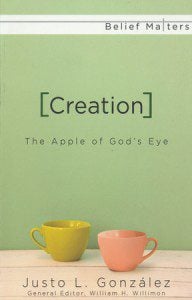 I recently picked up yet another book on Creation, this one by Justo L. González, a United Methodist minister and scholar. [Creation] The Apple of God’s Eye is a short book (99 pages) ideal for a small group study from high school through adult. This book isn’t a Bible study, rather it is a theological discussion of the nature of creation. In this post I want to look at two of the points González brings up in the second chapter.
I recently picked up yet another book on Creation, this one by Justo L. González, a United Methodist minister and scholar. [Creation] The Apple of God’s Eye is a short book (99 pages) ideal for a small group study from high school through adult. This book isn’t a Bible study, rather it is a theological discussion of the nature of creation. In this post I want to look at two of the points González brings up in the second chapter.
God is Love. González starts the discussion of creation with 1 John 4:8 Whoever does not love does not know God, because God is love. If God is love, then this will be a feature apparent in his creation, much the way that a painting or a evening gown or other creative human work reflects something of the one who created it.
Creation is born of God’s love. “In the very act of creation the love of God is made manifest. God does not need creation. God needs no one but God. Yet, God has created. God has taken the awful chance of creating something that is not God, something beyond Godself.” (p. 5) A little later: “God has decided that there will be another, an entire creation at once reflecting God’s nature and free to rebel against God’s will. This is God’s first, mysterious, inscrutable, yet wonderful act of love.” (p. 7)
“When we say that God is the Creator, we are not just trying to explain how things came into being. We are saying that the ultimate reality, that beyond which there is no other, is God and that this God is love!” (p. 7)
This emphasis is different from that found in most books discussing the nature of creation. God intentionally created something other than himself, including creatures with the free will to rebel and the moral sense to reflect on right and wrong.This was an intentional act of love. Love requires something or someone other to love. González points out that this does not mean that love was lacking prior to creation. The Trinity of one God in three persons means “that even God does not exist in solitary splendor. True love, that which exists in God, is such that even within the one God there is sharing, there is communion; and it is this sharing, this communion, that makes God one.” (p. 23) Nonetheless, we should view creation first and foremost as an act of love.
Two Creation Accounts, Four Gospels. When we focus on “how” questions, evolution or not, six days or billions of years, we will miss the point. The focus of the Biblical account isn’t on how, but on who and what. One key indication that the emphasis an emphasis on how is misplaced is found in Genesis 1 and 2. Here we have two different accounts of creation, with different ordering of the events of creation. This very fact should point us toward the intent of the creation stories – Genesis isn’t revealing how as much as it reveals who, what, and to some extent why.
González suggests that there is added value in two stories of creation, and in four Gospels. The different perspectives and emphases should force us to dig into the text for understanding rather than memorize it for facts.
But the fact that in the first chapters of Genesis there are two stories, and that both are the word of God means that we can never fully take possession and control of the story. Something similar happens in the New Testament, where we have not two but four different accounts of Jesus and his teachings. If we had only the Gospel of John, we could memorize it and claim that we know all there is to know about Jesus. But the very presence of four different Gospels, all attesting to the same truth, which cannot be combined into a single seamless whole, repeatedly forces us to correct and expand what we think we already know about Jesus. Having four Gospels that we cannot systematize into a single whole forces us to return to them over and over, never thinking that we possess the whole truth but always allowing God to speak to us through them. …
The same is true of the two stories in Genesis. Had we only one story, we could easily memorize it, claim we know all that we need to know about creation, and no longer need the biblical narratives. (p. 15-16)
The Bible as we have it is the word of God. Attempts to harmonize will distort the text and lead us away from, not into, the intended meaning and message.
Relationships. The biblical account of creation, and the Christian doctrine of creation is not focused on how the world was created. González concludes: “In brief, the doctrine of creation is neither only nor even primarily about origins, but rather about relationships: about the relationship between God and the world, between God and us, among us and others, and among all creatures. And all of this bearing the sign of the God who is love.” (p. 28-29) The two stories of creation in Genesis (and we could add Job and other creation passages in the Old Testament) emphasize different aspects of these relationships. John 1 emphasizes a new aspect of the creation relationships when he starts his Gospel In the beginning was the Word, … In him was life, and that life was the light of all mankind.
What does it mean to affirm God as both Love and Creator?
Is love risky?
If you wish to contact me directly you may do so at rjs4mail [at] att.net.
If interested you can subscribe to a full text feed of my posts at Musings on Science and Theology.















